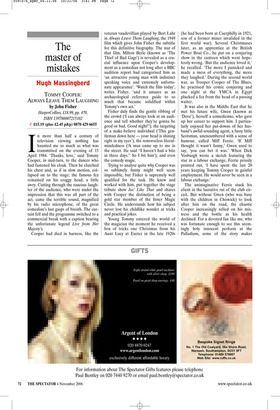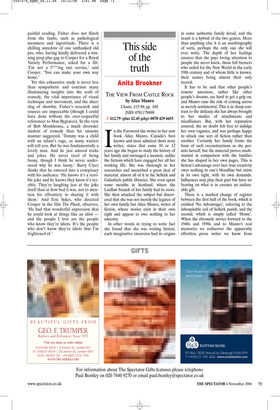The master of mistakes
Hugh Massingberd
TOMMY COOPER: ALWAYS LEAVE THEM LAUGHING by John Fisher HarperCollins, £18.99, pp. 470, ISBN 139780007215102 V £15.19 (plus £2.45 p&p) 0870 429 6655 In more than half a century of television viewing nothing has haunted me so much as what was transmitted on the evening of 15 April 1984. ‘Thanks, love,’ said Tommy Cooper, in mid-turn, to the dancer who had fastened his cloak. Then he clutched his chest and, as if in slow motion, collapsed on to the stage; the famous fez remained on his craggy head, a little awry. Cutting through the raucous laughter of the audience, who were under the impression that this was all part of the act, came the terrible sound, magnified by his radio microphone, of the great comedian’s last gasps of breath. The curtain fell and the programme switched to a commercial break with a caption bearing the unfortunate legend Live from Her Majesty’s.
Cooper had died in harness, like the veteran vaudevillian played by Bert Lahr in Always Leave Them Laughing, the 1949 film which gives John Fisher the subtitle for this definitive biography. The star of that film, Milton Berle (known as ‘The Thief of Bad Gags’) is revealed as a crucial influence upon Cooper’s development as a comedian not long after a BBC audition report had categorised him as ‘an attractive young man with indistinct speaking voice and extremely unfortunate appearance’. ‘Watch the film today’, writes Fisher, ‘and it amazes as an archaeological reference guide to so much that became solidified within Tommy’s own act.’ Fisher duly finds the gentle ribbing of the crowd (‘I can always look at an audience and tell whether they’re gonna be good or bad. Good night!’); the targeting of a make-believe individual (‘This gentleman down here — your head is shining right in my eyes’); the remorseless literalmindedness (‘A man came up to me in the street. He said “I haven’t had a bite in three days.” So I bit him’); and even the comedy magic.
Trying to analyse quite why Cooper was so sublimely funny might well seem impossible, but Fisher is supremely well qualified for the task. He knew and worked with him, put together the stage tribute show Jus’ Like That and shares with Cooper the distinction of being a gold star member of the Inner Magic Circle. He understands how his subject never lost his childlike wonder at tricks and practical jokes.
Young Tommy entered the world of the magician the moment he received a box of tricks one Christmas from his Aunt Lucy at Exeter in the late 1920s (he had been born at Caerphilly in 1921, son of a former miner invalided in the first world war). Several Christmases later, as an apprentice at the British Power Boat Co., he put on a conjuring show in the canteen which went hopelessly wrong. ‘But the audience loved it,’ he recalled. ‘The more I panicked and made a mess of everything, the more they laughed.’ During the second world war, as Trooper Cooper of The Blues, he practised his comic conjuring and one night at the YMCA in Egypt plucked a fez from the head of a passing waiter.
It was also in the Middle East that he met his future wife, Gwen (known as ‘Dove’), herself a comedienne, who gave up her career to support him. I particularly enjoyed her put-downs of her husband’s awful-sounding agent, a fussy little Scotsman, unencumbered with a sense of humour, called Miff Ferrie. ‘If Miff thought it wasn’t funny,’ Gwen used to say, ‘you can bet it was.’ When Dick Vosburgh wrote a sketch featuring the star in a labour exchange, Ferrie prissily pointed out, ‘I have spent the last 20 years keeping Tommy Cooper in gainful employment. He would never be seen in a labour exchange.’ The unimaginative Ferrie stuck his client in the lucrative rut of the club circuit. But without Gwen (who was busy with the children in Chiswick) to look after him on the road, the chaotic Cooper increasingly relied on his mistress and the bottle as his health declined. For a devoted fan like me, who was fortunate enough to see this seemingly holy innocent perform at the Palladium, some of the story makes painful reading. Fisher does not flinch from the faults, such as pathological meanness and ingratitude. There is a chilling anecdote of one unthanked old pro, who, having kindly delivered a winning prop plus gag to Cooper for a Royal Variety Performance, asked for a lift. ‘I’m not a f***ing taxi service,’ said Cooper. ‘You can make your own way home.’ Yet this exhaustive study is never less than sympathetic and contains many illuminating insights into the craft of comedy, the vital importance of visual technique and movement, and the sheer slog of showbiz. Fisher’s research and sources are impeccable (though I could have done without the over-respectful references to Max Bygraves). In the view of Bob Monkhouse, a much shrewder student of comedy than his smarmy manner suggested, ‘Tommy was a child with an infant’s rage, as many waiters will tell you. But he was fundamentally a lovely man. And he just adored tricks and jokes. He never tired of being funny, though I think he never understood why he was funny.’ Barry Cryer thinks that he entered into a conspiracy with his audience: ‘He knows it’s a terrible joke and he knows they know it’s terrible. They’re laughing less at the joke itself than at how bad it was, not to mention his effrontery in sharing it with them.’ And Eric Sykes, who directed Cooper in the film The Plank, observes, ‘He had that wonderful expression that he could look at things like an idiot and the people I love are the people who know they’re idiots. It’s the people who don’t know they’re idiots that I’m frightened of.’



















































































































 Previous page
Previous page